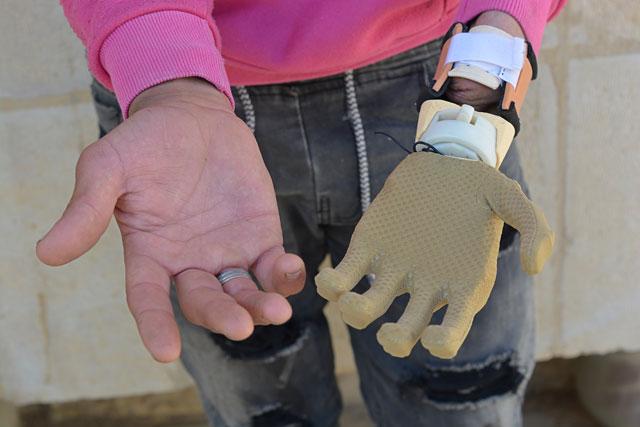You are here
Korean startup grants amputees normality ‘at cost of smartphone’
By Ana V. Ibáñez Prieto - Nov 21,2018 - Last updated at Nov 21,2018

Abdullah Musa, a 14-year-old beneficiary of Mand.ro receives training on how to use his new prosthetic hand, on Tuesday (Photo by Ana V. Ibáñez Prieto)
AMMAN — “Simple things such as holding a mirror while I do my makeup were only a dream throughout most of my life, but, now, I can try all sorts of new things I couldn’t do before,” said Daad Hantash, a congenital amputee who recently received a functional prosthetic hand donated by a Korean startup.
“This is a beautiful new experience and I am still learning how to do things, but I am beyond happy to know that I will be able to do everything just like anyone else,” Hantash told The Jordan Times on Tuesday.
Hantash is one of the over 100 Syrian refugees and Jordanian amputees who have benefitted from the donation of myoelectric prosthetic hands, enabling them to regain the functions and mobility of their upper limbs.
The Korean startup Mand.ro initiated its humanitarian project in January 2017, catering for the needs of war wounded Syrian refugees and vulnerable Jordanians by providing fully functional prosthetic hands.
Funded by the Korean International Cooperation Agency, the startup has brought its 3D printing technology to Jordan to manufacture prosthetic limbs for below-elbow amputees, in hopes of disseminating affordable, lightweight and functional prosthetic hands for those who need it the most.
“I work with refugees and I have met a lot of people who share my struggle as a result of war,” Hantash said, recalling the urge she felt to support them and why she started referring them to the Korean company.
“I was struggling at school not only because of the difficulties I face when doing normal tasks, but because of the pressure of my classmates,” 14-year-old Abdullah Musa told the The Jordan Times, shifting to his functional prosthetic hand. “It feels normal”, he said, adding that he could “finally do the things that everyone else does, like holding a cup or just grabbing anything”.
Elaborating on the origins of the startup, Mand.ro CEO Sangho Yi said that “it all started with one request — that of a 35-year-old bilateral amputee who asked for myoelectric prosthetic hands to regain mobility, but couldn’t afford them because the cost was $40,000”.
“Only 0.1 per cent of the amputees can actually afford such high costs, but we believe that there should not be anyone who can’t use a prosthetic functional hand just because they don’t have the money,” Yi said, recalling how the company took it upon itself to “make prosthetic hands at the cost of a smartphone”.
“One year and six months later, the product was fully launched in the South Korean market, but after learning about the Syrian crisis and the people who lost their limbs in bombings, we couldn’t help but provide humanitarian aid,” he continued.
After two years, more than 100 people in Jordan have received prosthetic hands as a result of the initiative, and another 300 prosthesis have been donated to the Jordanian Royal Medical Services for future use.
In addition, the company has sent two Jordanian technicians to train in South Korea for the production of prosthesis. “We have started by providing the product itself, but we also want to spread the knowledge so that the service can continue even when we are not here,” Yi said.
The CEO expressed his will to continue to work in Jordan in the upcoming years, noting that the group’s goals for 2019 are “to change the hand sockets of the youngest beneficiaries, to fix technical issues in current users, to create small lightweight hands for children and exoskeletons for people who did not lose their limbs but suffer from disabilities, and to create above elbow prosthesis”.
“But this is still big work in progress,” he said, calling on potential donours and partners in Jordan to come forward with support to start a new pilot project for the upcoming year.
Related Articles
AMMAN — Muhammad Nasser Kennan wanted to be a football coach after finishing school, but in the summer of his 10th grade, his dreams were pu
AMMAN — SwissLeg, a social enterprise based in Lugano, Switzerland, that develops “high-tech” prosthetic limbs for amputees, recently organi
Aguilar was born without a right forearm as a result of Poland syndrome, a rare disorder which can cause severe abnormalities in the shoulder, arm or hand, but it has not stopped him from living his life.













